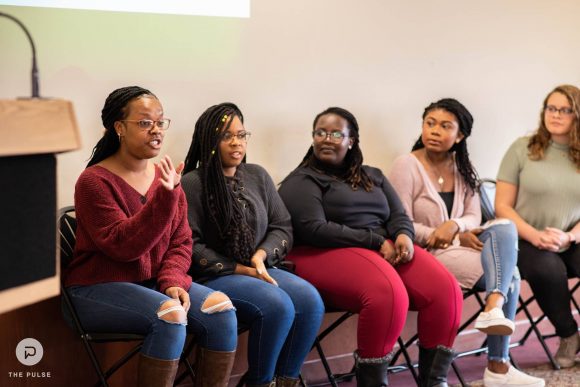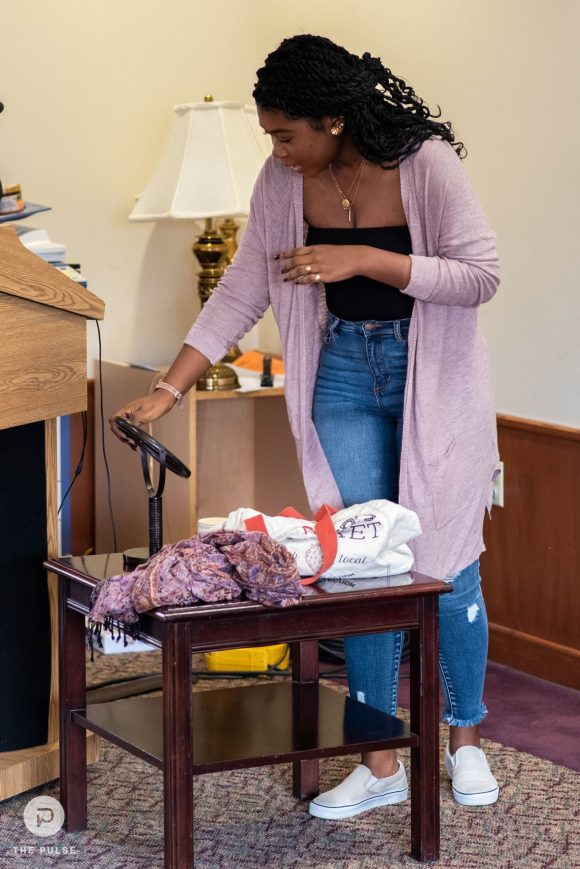Cosette Schulties
Student Writer
The Black Student Union hosted a Hair Expo on Saturday in celebration of beauty within the black community. As a continuation of last year’s “How’d You Get Your Hair Like That?” this event featured demonstrations, a panel discussion and prize giveaways.
President of BSU Nora Nworu opened with a quote from Erica Thurman about the experience of black hair. “The idea of black women wearing their kinks and coils in their natural state is about redefining beauty and euro-centric standards of such. Natural hair is about loving ourselves for who we are completely and embracing the one part of us that society refused to acknowledge as beautiful.”
“What she quoted is actually very significant,” said Nworu. “I feel like it touches on a lot of issues within the community.”
After explaining the hair types ranging from 1A to 4C (straighter to more tightly coiled), the audience watched a video that ‘debunked’ myths about black hair, such as stigmas that curls are unruly, unkempt or unprofessional. The background information provided a foundation for the coming panel conversation.
In addition to President Nworu, panelists included Cherisse Daniels, the Assistant Director of Multicultural Programs; Gloria Igihozo, Chair of the Multicultural Council; senior Horacia Carryl; and Alexis Robinson, First-year Liaison of BSU.
Testimonies from the women circled around a common theme of developing a positive self-esteem throughout their hair-care journeys. Most began from young childhood and concluded at present-day update – suggesting a never-ending process.
Igihozo said “even though I’ve come to a place where I embrace my hair, I still feel like I don’t measure up to other people. It’s definitely a process of self-acceptance.”
“My biggest thing,” said Nworu, “is accepting my hair for how it grows out of my scalp. I realized I’m trying to fit in with this picture of white perfection.”
This approach to fitting in with euro-centric standards coerced women to try methods that created unhealthy results.
In her testimony, Igihozo said, “in Rwanda, straight-hair is seen as professional, so I kept getting perms.” Years of this process resulted in irreversible damage. In high school, Igihozo decided to shave her hair off. “It was my little triumph,” she said.
Carryl, Daniels, and Nworu also testified to chopping off most – if not all – of their hair because of breakage caused by heat, chemicals, and/or dye.
“I made myself a promise that I was going to be natural by the start of [college] freshman year,” said Carryl. “So, I cut all my hair off – like I was bald.” While fanning away tears, she said, “I felt really liberated.”
With the growing popularity of the natural hair movement, more people are sharing tips and tricks of how to care for curly or kinky hair. Panelists unanimously agreed that video demonstrations from other women of color helped them discover what works for them.
“YouTube saved my life, it taught me to really care for my hair,” said Daniels. “I felt beautiful with my curly hair and it was so important for me to show that.”
Two demonstrations gave audience members the chance to gain some insight right then and there. Vice President of the Student Body Marianne Ramirez-Gomez narrated her daily hair routine and Carryl showed how she puts in twists – a protective style that uses extensions.
“[T]he demonstrations were really transparent and vulnerable, which I appreciated,” said sophomore Andrea Perez. “I felt like a lot of people learned from them, not just how to do their hair, but to be comfortable enough not to hide it.”
To wrap up the expo, BSU cabinet members announced winners of gift bags that contained hair and body products from various donors. Each person who attended the event also left with a small package of hair care supplies.
Sophomore Leiby Soto expressed gratitude by saying, “This was the first time that I celebrated my curly hair and felt proud of it.
For more information about BSU meetings or events for next semester, please contact blackstudentunion@messiah.edu.


